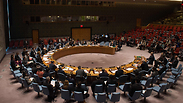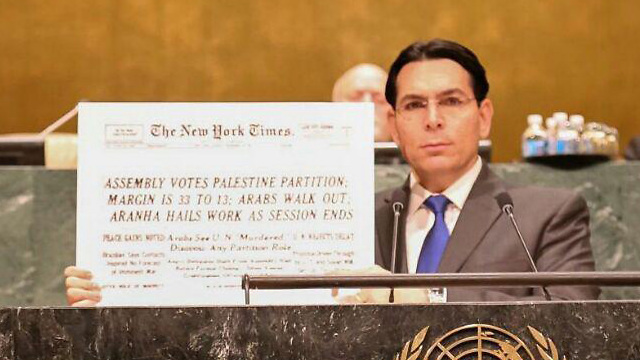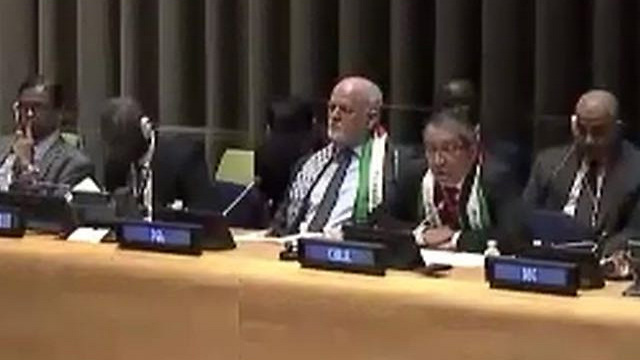
UN calls on Israel to leave Golan, Israel prepares fight at UNSC
As the UN General Assembly calls again on Israel to leave the Golan Heights and declares Israeli jurisdiction on 'the Holy city of Jerusalem' to be 'null and void,' the Jewish state prepares to go up against three UNSC resolutions aimed against it.
The move comes a day after the new President of the UN General Assembly, Peter Thompson, was seen wearing a Palestinian scarf whilst at a UN committee hearing.
The resolution, called UNGA Resolution A/71/L.8, was put forth by over 35 countries, including Bahrain, Bolivia, Cuba, Ecuador, Indonesia, Egypt, Syria, Jordan, Lebanon, Saudi Arabia, Nicaragua, Nigeria, Zimbabwe, and the Palestinian delegation, amongst others.
The resolution calls for peace talks between Syria and Israel and Lebanon and Israel to be restarted immediately, calls for the Israeli withdrawal from the Golan Heights, and determines that Israel being in the Golan Heights and Israel’s de-facto annexation of the Golan Heights represents a key stumbling block to regional peace.
It was passed in the UN General assembly by a vote of 103 for, 6 against (Canada, Federated States of Micronesia, Israel, Marshall Islands, Palau, and the United States), and 56 abstentions.
The resolution is one of six anti-Israel resolutions passed Wednesday, another being on the status of Jerusalem (A/71/L.22). In it, the UN expressed “its determination that any actions taken by Israel, the occupying Power, to impose its laws, jurisdiction and administration on the Holy City of Jerusalem are illegal and therefore null and void and have no validity whatsoever”.
The representative from Israel said in the assembly following the vote that “it was shameful how some countries had yet to accept the existence of Israel and abused the General Assembly to spread baseless allegations,” and that the resolutions seek to provide a “biased narrative.”
She continued, saying “since 2015, terror attacks against Israelis had claimed the lives of 42 citizens and injured over 600 and yet today’s resolutions made no mention of those victims.”
“Furthermore, the resolutions under discussion did not mention the internationally recognized terror organization Hamas. No one should delude themselves: supporting the resolutions and the inherent bias against Israel would not advance the cause of peace. Rather it would only make peace harder to achieve,” the representative added.
The US delegation meanwhile, said the US was “profoundly troubled by the submission of a disproportionate number of one-sided resolutions that had been designed to condemn Israel.”
The delegate continued, adding that “it (is) manifestly unjust that the United Nations, an institution founded on the idea that all nations should be treated equally, was so often used by Member States to treat Israel unequally.”
Lambasting the UN, the delegate continued, saying “three United Nations bodies in particular reflected the bias and unnecessary costs of such resolutions and wasted limited resources. Costing approximately $6.1 million in 2015, they did nothing to contribute to peace in the region.”
The US however did reiterate that it views the settlements as a stumbling block for peace.
Syria for its part, thanked the member states who voted for the resolution, saying the vote “sent a clear message to Israel that its killing, settlement expansion and forcible annexation of land ran counter to international principles.”
The next round: The UN Security Council
Meanwhile, the Israeli Foreign Ministry is expecting a tough fight against several anti-Israel resolutions which are due to be voted on at the UN Security Council before US President Obama leaves office.
There are three initiatives which especially worry Israel; initiatives from New Zealand, the Palestinians, and France.
New Zealand
New Zealand, which will be vacating its position on the council soon, wants to put forth a resolution which will require Israel to condemn settlement construction, condemn violence and incitement from both the Israelis and the Palestinians, condemn the humanitarian situation in Gaza, and call for an immediate re-start of negotiations between the Palestinians and the Israelis. A draft resolution is expected to be submitted in the coming days
The Palestinians
The Palestinians are trying to pass a resolution which will term the Israeli settlements in the West Bank illegal. Israel is worried that such a decision will prepare the groundwork for sanctions, and be a precursor for an indictment against Israel at the International Criminal Court in The Hague.
France
The French resolution calls for an international peace conference, which Israel has already expressed its opposition to. The opposition is premised on the fact that the initiative calls on a time table for discussions, and that should no agreement be reached, France will automatically recognize a Palestinian state.
Israel believes that the US will use its veto power over the French and Palestinian initiatives, yet is unsure as to US action towards the New Zealand initiative. This is because the New Zealand initiative does not seem to be unilaterally condemning one side or the other for incitement and violence.
While Israel is working primarily with the Americans in the Security Council, Israel is also working with other countries as well.
US Secretary of State is expected to discuss the issue at the upcoming Saban Forum.












